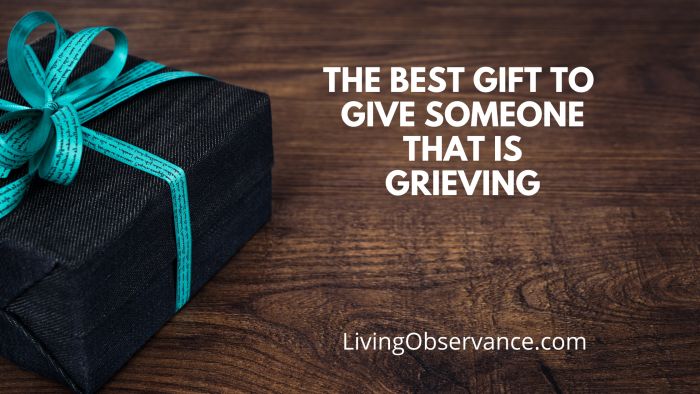Before jumping into the main subject of this post, I have a disclaimer. Unfortunately, this gift only works if you personally knew the person that passed away. If you didn’t know the person that passed away but still want to support someone who is grieving, Dr. Alan Wolfelt Ph.D. has done an exceptional job with the Companioning Approach. Dr. Wolfelt’s approach uses 11 simple tenets that provide everyone with the tools necessary to support a bereaved person.
If you did know the person that passed away, then you are in a unique position to give a gift that the bereaved will cherish for many years to come. As I mentioned in the post about the New Model of Grief by Dr. Tony Walter, and the post about the poem Farewell Father by Stefan Molyneux, one of the core struggles we have with grief is understanding what exactly we lose when a person dies and why it is so painful.
At a Glance
Personal experience
As I was mourning the loss of my mother, I felt like I was drowning in my grief. I tend to keep my cards close to hand and try not to broadcast my internal struggles to the external world. This resulted in me seeming stand-offish and cold to the people that were trying to support me. Occasionally people would engage me in directionless conversation about how I am doing and what they could do to help me. The interactions were short because I couldn’t articulate what I needed to feel better. I already had the administrative tasks taken care of. I tried to avoid conversations about my mom because I didn’t think I was emotionally ready.
Over the next 3 years, my wife lost her mother, grandpa, and aunt. My wife is from Taiwan, so there are some cultural differences surrounding death, but we still learned several lessons that are universal. The most applicable lesson here is about conversations about the loved one that passed away. In preparation for the funeral service, the family will gather together and make origami offerings that will be cremated with the body. As the family is working together to create offerings that honor the deceased, they are sharing happy memories about their loved one. The foldings take place in large rooms that accommodate around 15-20 families. When I first walked into the room I was surprised by how jovial the atmosphere was. I was expecting to see many sad and weeping faces. On the contrary, most people had smiles on their faces, and some were even chuckling quietly.
It wasn’t until my grandpa passed away that I recognized one of the greatest gifts to give someone who lost a loved one. I regularly went to visit my grandmother after my grandpa passed. Each time she would share the sympathy cards that had arrived. Many of the cards said something to the effects of what a great man my grandpa was, how they will miss him, and that they are sorry for the loss. There is one card that stood out from all of the others. It was simple and from someone at the church who knew my grandpa, but I wouldn’t say they were very close. I’m going to paraphrase, but inside the card, it said something along the lines of:
“I will always remember our second visit to St Mary’s. The first visit is marked by meeting Jack (my grandpa). It has been a long time since we had met someone with his kindness and wit. We genuinely felt like we were long-time friends after that first visit. When we came back the next week, I saw Jack happily chatting with others across the hall and I yelled, “Hi Jack!” and waved to him. The smile on his face quickly faded and he hurried over to me with a grim look on his face. He leaned in and whispered, “Don’t ever say that in an airport!” before he burst into laughter and pulled me close for a hug.”
My Grandma, Aunts, Uncles, Cousins, and I look at that card regularly. It captures a small piece of the person we love and preserved it for us.
What To Send When Someone Dies
The best condolence gift or sympathy gift is a simple hand-written note of a memory that you shared with the deceased.
One of the core practices that I recommend in my post about The Best Method for Healthy Grieving is preserving positive memories about the deceased. By writing down a positive memory, you are accomplishing many different tasks that help the grieving person.
- You are helping them shift their focus from the negative perspective of what they have lost to a positive view of realizing all of the positive memories they still have
- You are “returning a book to the library of the deceased” and creating a written record that helps all of the grieving parties create a shared image of the deceased
- You are allowing the bereaved person to revisit memories of the deceased when they are ready and, because it is written down, as many times as they would like
- You are allowing the bereaved person the opportunity to share your memory with other grieving parties that you may not be familiar with
Conclusion:
I hope that this post has given you an idea about what you can say or give to someone that lost a loved one. The best gifts don’t cost money, and the most comforting words you can say don’t need to be fancy or flowery.
What do you think about my gift recommendation? Is there a more meaningful gift that you have received?


